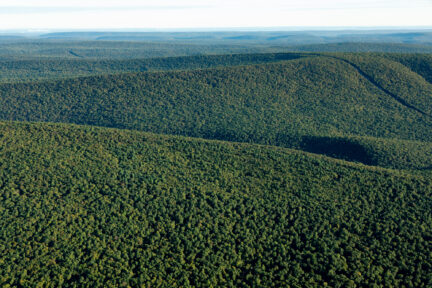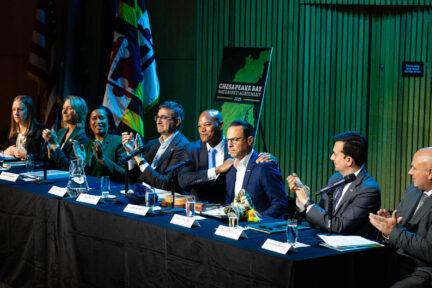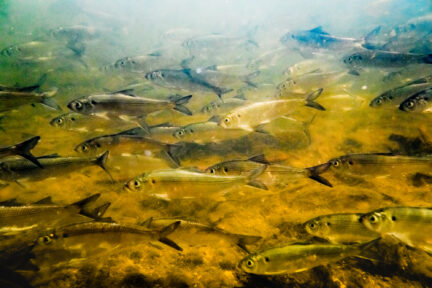Thirty-four Environmental Projects Receive $3.4 Million to Protect and Restore Chesapeake Bay and Lo
Thirty-four Environmental Projects Receive $3.4 Million to Protect and Restore Chesapeake Bay and Lo
Thirty-four environmental projects in all six of the Chesapeake Bay watershed states and the District of Columbia were today awarded more than $3.4 million to help reduce pollution to local streams, creeks and rivers and the Chesapeake Bay. The grants are funded by the U.S. EPA’s Chesapeake Bay Program and a variety of other federal and private partners. They are administered by the National Fish and Wildlife Foundation.
The funding for the projects was awarded through the Chesapeake Bay Small Watershed Grants Program, which provides grants to nonprofit organizations and local governments working to improve the condition of their local watershed.
The 2010 grant recipients will develop conservation plans in both urban and rural settings, preserve valuable natural lands, and implement on-the-ground and in-the-water restoration practices throughout the Chesapeake Bay watershed. Many of the projects will employ social media campaigns to fully engage the community in the local restoration and conservation efforts. Some examples of the types of projects funded include:
- Large-scale installations of rain gardens and rain barrels.
- Stormwater retrofit and green building design actions for places like schools and urban buildings.
- An “Extreme Stream Makeover” restoration project and other stream or forest restorations.
- A social and educational outreach program to educate citizens about conservation easements.
- Several efforts to reduce nitrogen and phosphorus runoff from agricultural operations into local streams.
“Local action is essential to restoring clean water to the region’s streams, creeks, rivers and the Chesapeake Bay, and EPA is committed to supporting the efforts of local governments, watershed groups and universities that do incredible work everyday,” said Shawn Garvin, EPA Regional Administrator. “Clean water is important to every community, so it’s vital that these projects will occur in all six states in the Chesapeake Bay watershed and the District of Columbia.”
The 2010 Small Watershed Grants were announced at Dundalk Veterans Park near Baltimore, Md. The project highlighted today was the “Trees for Neighborhoods” initiative of the Baltimore County Department of Environmental Protection and Resource Management. Baltimore County is using its $50,000 grant to educate homeowners about the benefits of planting trees as a way to reduce polluted runoff. In the greater Baltimore area, many projects like this one will be undertaken to address urban stormwater, restore wetland habitats and encourage environmental stewardship.
“The Small Watershed Grants program provides important funding that gives local governments and organizations the tools they need to help improve the overall health of the Chesapeake Bay’s watershed,” said Senator Benjamin L. Cardin, a member of the Environment and Public Works Committee. “From planting more trees in urban areas to improving wildlife habitat and minimizing stormwater runoff, these grants result in partnerships that help restore and protect the Bay.”
Polluted runoff from urban and suburban impervious surfaces and agricultural lands continue to be two large sources of nitrogen, phosphorus and sediment to local waterways and the Chesapeake Bay. These grants will help fund the projects necessary to reduce runoff in many areas and from all types of lands, both urban and agricultural, within the Bay watershed.
“The Chesapeake Bay is one of Maryland’s greatest resources. We must protect it so our children and grandchildren can enjoy it,” said Congressman C.A. Dutch Ruppersberger. “Whether it is eating perfectly steamed blue crabs harvested from the Bay, hiking along the many historic trails in the watershed, or spending a beautiful day on a historic skipjack, the Chesapeake Bay adds so much to our quality of life here in Maryland while also supporting thousands of jobs across our state.”
”This program is an example of a truly effective public-private partnership that delivers funding to high-impact, on-the-ground restoration projects in communities throughout the region,” explained Amanda Bassow, Acting Director of the National Fish and Wildlife Foundation’s Eastern Partnership Office. “EPA’s $2 million investment in grants has leveraged $1.4 million from other government agencies and private funders who all share the conviction that these community-based efforts to restore local rivers and streams are critical to the health of the Chesapeake Bay.
Since 2000, the Chesapeake Small Watershed Grants program has provided more than $27 million to support 626 projects around the Chesapeake Bay watershed. These projects have further leveraged close to $90 million in local matching funds for a total conservation investment in on-the-ground restoration of over $115 million. The program is administered by the National Fish and Wildlife Foundation and funded by the U.S. EPA’s Chesapeake Bay Program Office and a variety of annual partners. Additional support in 2010 was provided by the U.S. Forest Service, National Oceanic and Atmospheric Administration, and the District of Columbia Department of the Environment, as well as additional corporate funds from Altria and FedEx. Additional funding for grants in Maryland was provided through a community service payment that resulted from a plea agreement with the U.S. Department of Justice in a case involving the concealment of discharges of sludge and bilge waste.
For more information about the Chesapeake Bay Small Watershed Grants Program and a full list of this year’s grant recipients, visit the Chesapeake Bay Small Watershed Grants Program page and www.nfwf.org/chesapeake.



